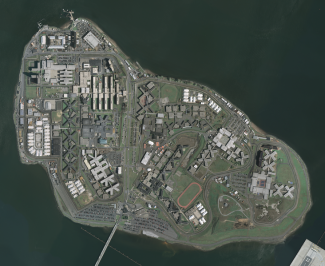
via Wikimedia
Among prisons and jails that notoriously have a bad reputation, New York’s Rikers Island facility stands out. It’s a jail made infamous by its danger, poor conditions, and the long-standing movement to shut it down.
Now, that movement has gained enough ground to make closing the facility’s doors a reality. New York City Mayor Bill De Blasio announced in 2017 that “New York City will close the Rikers Island jail facility.” He went on to say, “It will take many years. It will take many tough decisions along the way. But it will happen.”
The Washington Post reports that the New York City Council voted “in favor of an $8 billion plan that would replace the facility with jails in four of the city’s five boroughs.” Still, for many activists who hoped to see the prison complex shuttered, there’s a problem with the city’s new plan.
Closing Rikers in order to open new facilities was not the future they’d imagined for New York City. Thus, a coalition known as No New Jails NYC was formed to combat the city’s plan to replace Rikers with multiple new facilities, which city leaders say will be “more humane.”
Opponents to more jails, however, refute this possibility. According to activists, there’s no such thing as a humane jail and no reason for the city to invest in new facilities, especially when it could be investing in much-needed community resources. They point to the fact that when Rikers was built in the 1930s, it was promoted as a symbol of progress, touted as “the most perfect prison in the world.”
Named after a man involved in the fugitive slave trade, “Richard Riker was the legal official responsible for returning the city’s fugitive slaves to their masters in the South.” Activists feel the facility, the second-largest of its kind in the nation, is an extension of his legacy, pointing to links between enslavement, emancipation, and the rise of mass incarceration.
Some city officials in favor of new jails are arguing from a difficult position that the new penal institutions are necessary amid declines in crime. But No New Jails NYC has created a detailed abolitionist proposal that highlights how incarceration does not deter crime.
One of the primary case studies against jails comes from Cincinnati, Ohio. Plans to close the Queensgate Correctional Facility in Cincinnati were met with concerns that crime would increase… but what happened instead shocked many.
The Appeal notes that “[f]rom 2008 to 2014, violent crime in Cincinnati dropped by 38.5 percent, property crime by 18.9 percent. Felony arrests dropped by 41.3 percent, and misdemeanor arrests by 32.7 percent.”
The hope for many is that instead of spending over $10 billion on new facilities, the city will invest in social services, which could potentially stop crime before it starts. This ongoing public debate is especially important to Black New Yorkers who suffer from the disproportionate effects of mass incarceration through policing, arrests, and incarceration in jails like Rikers